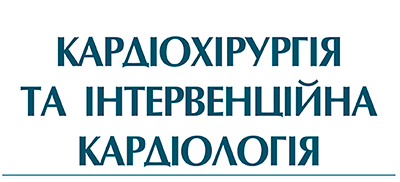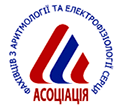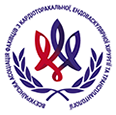Diagnosis and prognostic value of asymptomatic atrial fibrillation
N.S. Pavlyk, U.P. Chernyaha-Royko, M.S. Sorokivskyy, A.V. Aker, O.J. Zharіnov
References
- Zharinov OI, Zalizna YI, Mikhalev KO. Symptoms and clinical characteristics of patients with the newly detected atrial fibrillation. UMJ Heart and Vessels (Ukrainian). 2014;4:33–39. (in Ukr.).
- Order of the Ministry of Health of Ukraine dated June 15, 1966, № 597 Unified clinical protocol of primary, secondary (specialized) and tertiary (highly specialized) medical aid «Atrial fibrillation». 2016. 82 с. (in Ukr.).
- Pavlyk NS, Chernyaha-Royko UP, Pavlyk SS, Zharinov OJ. Clinical characteristics of hospitalized patients with silent atrial fibrillation and flutter in one-center registry. Ukrainian Journal of Cardiology. 2015;6:72–78. (in Ukr.).
- Sribna OM., Gorbas IM. The prevalence of violations of rhythm and conductivity among the rural population of Ukraine. Ukrainian Journal of Cardiology. 2008;2:89–94.(in Ukr.).
- Aleong RG, Sauer WH, Davis G. et al. New-onset atrial fibrillation predicts heart failure progression. Am. J. Med. 2014;127(10):963–971.
- Alonso A, Bengtson LGS. A Rising Tide: The Global Epidemic of Atrial Fibrillation. Circulation. 2014;129(8):829–830.
- Arbelo E, Brugada J, Hindricks G. et al. The Atrial Fibrillation Ablation Pilot Study: an European Survey on Methodology and Results of Catheter Ablation for Atrial Fibrillation: conducted by the European Heart Rhythm Association. Eur. Heart. J. 2014;35(22):1466–1478.
- Askew JW, Todd DM, Hodge DO. еt al. The Value of Myocardial Perfusion Single-Photon Emission Computed Tomography in Screening Asymptomatic Patients With Atrial Fibrillation for Coronary Artery Disease. J. Am. Coll. Cardiol. 2007;50:1080–1085.
- Baibars M, Kanjwal K, Marine JE. et al. AF Detected on Implanted Cardiac Implantable Electronic Devices: Is There a Threshold for Thromboembolic Risk? Curr. Treat. Options Cardiovasc. Med. 2014;16(3):289.
- Benezet-Mazuecos J, Iglesias JA, Cortes M. et al. Silent brain infarcts in high blood pressure patients with cardiac implantable electronic devices: unmasking silent atrial fibrillation. J. Hypertens. 2016;34(2):338–344.
- Bhandari AK, Anderson JL, Gilbert EM. et al. The Flecainide Supraventricular Tachycardia Study Group. Correlation of symptoms with the occurrence of paroxysmal supraventricular tachycardia or atrial fibrillation: a transtelephonic monitoring study. Am. Heart. J. 1992;124(2):381–386.
- Björkenheim A, Brandes A, Chemnitz A. et al. Rhythm Control and Its Relation to Symptoms during the First Two Years after Radiofrequency Ablation for Atrial Fibrillation. Pacing. Clin. Electrophysiol. 2016;39(9):914–925.
- Bloch Thomsen PE, Jons C, Raatikainen MJ. et al. Long-term recording of cardiac arrhythmias with an implantable cardiac monitor in patients with reduced ejection fraction after acute myocardial infarction: the Cardiac Arrhythmias and Risk Stratification After Acute Myocardial Infarction (CARISMA) study. Circulation. 2010;122(13):1258–1264.
- Boriani G, Laroche C, Diemberger I. et al. Asymptomatic atrial fibrillation: Clinical correlates, management, and outcomes in the EORP-AF Pilot General Registry. Am. J. Med. 2015;128:509–518.
- Boriani G, Valzania C, Biffi M. et al. Asymptomatic Lone Atrial Fibrillation – How Can We Detect The Arrhythmia? Curr. Pharm. Des. 2015;21(5):659–666.
- Brignole M, Moya A, de Lange F.J. et al. 2018 ESC Guidelines for the diagnosis and management of syncope. Eur. Heart. J. 2018;39(21):1883–1948.
- Cabrera S, Mercé J, de Castro R. et al. Pacemaker clinic: an opportunity to detect silent atrial fibrillation and improve antithrombotic treatment. Europace. 2011;13(11):1574–1579.
- Сamm AJ, Kirchhof P, Lip GY. et al. ESC guidelines for the management of atrial fibrillation. Eur. Heart J. 2012;33(21):2719–2747.
- Сamm A.J, Kirchhof P, Lip G.Y. et al. Guidelines for the management of atrial fibrillation: the Task Force for the Management of Atrial Fibrillation of the European Society of Cardiology (ESC). Eur. Heart J. 2010;31:2369–2429.
- Camm AJ, Waldo AL. Atrial High-Rate Events (AHRES): Look and You Will Find–Then What? Circulation. 2017;136:1795–1797.
- Campbell N.G, Cantor E.J, Sawhney V. et al. Predictors of new onset atrial fibrillation in patients with heart failure. Int. J. Cardiol. 2014;175(2):328–332.
- Capucci A, Calcagnini G, Mattei E. еt al. Daily distribution of atrial arrhythmic episodes in sick sinus syndrome patients: implications for atrial arrhythmia monitoring. Europace. 2012;14(8):1117–1124.
- Chen CH, Chen MC, Gibbs H.et al. Antithrombotic treatment for stroke prevention in atrial fibrillation: The Asian agenda. Int. J. Cardiol. 2015;191:244–253.
- Chen KP, Dai Y, Hua W. et al. Reduction of atrial fibrillation in remotely monitored pacemaker patients: results from a Chinese multicentre registry. Chin. Med. J.(Engl). 2013;126(22):4216–4221.
- Chovančík J, Bulková V, Fiala M. et al. A comparison of two methods of long-term external ECG telemonitoring in patients after ablation for atrial fibrillation. Vnitr. Lek. 2012;58(9):633–639.
- Christensen LM, Krieger DW, Højberg S. et al. Paroxysmal atrial fibrillation occurs often in cryptogenic ischaemic stroke. Final results from the SURPRISE study. Eur. J. Neurol. 2014;21(6):884–889.
- Chugh SS, Havmoeller R, Narayanan K. et al. Worldwide epidemiology of atrial fibrillation: a Global Burden of Disease 2010 Study. Circulation. 2014;129(8):837–847.
- Cotter PE, Martin PJ, Ring L. et al. Incidence of atrial fibrillation detected by implantable loop recorders in unexplained stroke. Neurology. 2013;80(17):1546–1550.
- Damiano RJJr, Lawrance CP, Saint LL. et al. Detection of Atrial Fibrillation After Surgical Ablation: Conventional Versus Continuous Monitoring. Ann.Thorac.Surg. 2016;101(1):42–47.
- Dilaveris PE, Kennedy HL. Silent atrial fibrillation: epidemiology, diagnosis, and clinical impact. Clin. Cardiol. 2017;40(6):413–418.
- Disertori M, Lombardi F, Barlera S. at al. Clinical characteristics of patients with asymptomatic recurrences of atrial fibrillation in the Gruppo Italiano per lo Studio della Sopravvivenza nell’Infarto Miocardico-Atrial Fibrillation (GISSI-AF) trial. Am. Heart. J. 2011;162(2):382–389.
- Dobreanu D, Svendsen JH, Lewalter T. еt al. Current practice for diagnosis and management of silent atrial fibrillation: results of the European Heart Rhythm Association survey. Europace. 2013;15(8):1223–1225.
- Fernandez V, Béjot Y, Zeller M. et al. Silent atrial fibrillation after ischemic stroke or transient ischemic attack: interest of continuous ECG monitoring. Eur. Neurol. 2014;71(5–6):313–318.
- Fetsch Т, Bauer P, Engberding R. et al. Prevention of artrial fibrillation after cardioversion: results of the PAFAC trial. Eur. Heart. J. 2004;25:1385–1394.
- Flaker GC, Belew K, Beckman K. et al. Asymptomatic arial fibrillation: demographic features and prognostic information from the Atrial fibrillation Follow-up Investigation of Rhythm Management (AFFIRM) study. Am. Heart. J. 2005;149(4):657–663.
- Forleo GB, Tondo C. Atrial fibrillation: cure or treat? Ther. Adv. Cardiovasc. Dis. 2009;3(3):187–196.Show all authors
- Freedman B, Camm J, Calkins H. et al. Screening for Atrial Fibrillation: A Report of the AF-SCREEN International Collaboration. Circulation. 2017;135(19):1851–1867.
- Gang UJ, Nalliah CJ, Lim TW. et al. Atrial ectopy predicts late recurrence of atrial fibrillation after pulmonary vein isolation. Circ. Arrhythm. Electrophysiol. 2015;8(3):569–574.
- Gladstone DJ, Spring M, Dorian P. et al. Atrial fibrillation in patients with cryptogenic stroke. New Engl. J. Med. 2014;370(26):2467–2477.
- Glotzer TV, Daoud EG, Wyse DG. et al. The relationship between daily atrial tachyarrhythmia burden from implantable device diagnostics and stroke risk: the TRENDS study. Circ. Arrhythm. Electrophysiol. 2009;2(5):474–480.
- Glotzer TV, Hellkamp AS, Zimmerman J. et al. Atrial high rate episodes detected by pacemaker diagnostics predict death and stroke: report of the Atrial Diagnostics Ancillary Study of the MOde Selection Trial (MOST). Circulation. 2003;107(12):1614–1619.
- Glotzer TV, Ziegler PD. Cryptogenic stroke: Is silent atrial fibrillation the culprit? Heart Rhythm. 2015;12(1):234–241.
- Go AS, Reynolds K, Yang J. et al. Association of Burden of Atrial Fibrillation With Risk of Ischemic Stroke in Adults With Paroxysmal Atrial Fibrillation: The KP-RHYTHM Study. JAMA Cardiol. 2018;3(7):601–608.
- Grond M, Jauss M, Hamann G. et al. Improved detection of silent atrial fibrillation using 72-hour Holter ECG in patients with ischemic stroke: a prospective multicenter cohort study. Stroke. 2013;44(12):3357–3364.
- Guerra F, Brambatti M, Nieuwlaat R.et al.Symptomatic atrial fibrillation and risk of cardiovascular events: data from the Euro Heart Survey. Europace. 2017;19(12):1922–1929.
- Halcox JPJ, Wareham K, Cardew A. et al. Assessment of Remote Heart Rhythm Sampling Using the AliveCor Heart Monitor to Screen for Atrial Fibrillation: The REHEARSE-AF Study. Circulation. 2017;136(19):1784–1794.
- Healey JS, Alings M, Ha A. et al. Subclinical Atrial Fibrillation in Older Patients. Circulation. 2017;136(14):1276–1283.
- Healey JS, Connolly SJ, Gold MR. еt al. Subclinical atrial fibrillation and the risk of stroke. New Engl. J. Med. 2012;366(2):120–129.
- Hobbs FD, Fitzmaurice DA, Mant J. et al. A randomised controlled trial and cost-effectiveness study of systematic screening (targeted and total population screening) versus routine practice for the detection of atrial fibrillation in people aged 65 and over. The SAFE study. Health Technol. Assess. 2005;9(40) III–IV, IX-X:1–74.
- See comment in PubMed Commons belowHohendanner F, Heinzel FR, Blaschke F.et al. Pathophysiological and therapeutic implications in patients with atrial fibrillation and heart failure. Heart. Fail. Rev. 2018;23(1):27–36.
- Hoshino T, Ishizuka K, Nagao T. et al. Slow sinus heart rate as a potential predictive factor of paroxysmal atrial fibrillation in stroke patients. Cerebrovasc. Dis. 2013;36(2):120–125.
- Jorfida M, Antolini M, Cerrato E. et al. Cryptogenic ischemic stroke and prevalence of asymptomatic atrial fibrillation: a prospective study. J. Cardiovasc. Med. (Hagerstown). 2016;17(12):863–869.
- Karthikeyan G, Ananthakrishnan R, Devasenapathy N. еt al. Transient, subclinical atrial fibrillation and risk of systemic embolism in patients with rheumatic mitral stenosis in sinus rhythm. Am. J. Cardiol. 2014;114(6):869–874.
- Kawasaki S, Tanno K, Ochi A. et al. Recurrence of atrial fibrillation within three months after pulmonary vein isolation for patients with paroxysmal atrial fibrillation: Analysis using external loop recorder with auto-trigger function. J. Arrhythm. 2015;31(2):88–93.
- Kennedy HL. Silent Atrial Fibrillation: Definition, Clarification, and Unanswered Issues. Ann. Noninvasive. Electrocardiol. 2015;20(6):518–525.
- Kerr C, Boone J, Connolly S. et al. Follow-up of atrial fibrillation: the initial experience of the Canadian Registry of Atrial Fibrillation. Eur. Heart. J. 1996;17 (Suppl. C):48–51.
- Kirchhof P, Benussi S, Kotecha D. et. аl. ESC Guidelines for the management of atrial fibrillation developed in collaboration with EACTS. Eur. Heart. J. 2016;37(38):2893–2962.
- Latini R, Staszewsky L, Sun JL. et al. Incidence of atrial fibrillation in a population with impaired glucose tolerance: the contribution of glucose metabolism and other risk factors. A post hoc analysis of the nateglinide and valsartan in impaired glucose tolerance outcomes research trial. Am. Heart. J. 2013;166(5):935–940.
- Lau CP, Siu CW, Yiu KH.et al. Subclinical atrial fibrillation and stroke: insights from continuous monitoring by implanted cardiac electronic devices. Europace. 2015;17:40–46.
- Lima C, Martinelli M, Peixoto G.L. et al. Silent Atrial Fibrillation in Elderly Pacemaker Users: A Randomized Trial Using Home Monitoring. Ann. Noninvasive Electrocardiol. 2016;21(3):246–255.
- Lip GY, Laroche C, Dan GA. et al. A prospective survey in European Society of Cardiology member countries of atrial fibrillation management: baseline results of EURObservational Research Programme Atrial Fibrillation (EORP-AF) Pilot General Registry. Europace. 2014;16(3):308–319.
- Lippman N, Tolat A. Update on the Non-Pharmacological Management of Stroke Prevention in Patients with Atrial Fibrillation. Clin. Med. 2018;7(2):32.
- Lloyd-Jones DM, Wang TJ, Leip EP. et al. Lifetime risk for development of atrial fibrillation: the Framingham Heart Study.Circulation. 2004;110(9):1042–1046.
- Lowres N, Neubeck L, Redfern J. et al. Screening to identify unknown atrial fibrillation. A systematic review. Thromb. Haemost. 2013;110(2):213–222.
- Manganiello S, Anselmino M, Amellone C. et al. Symptomatic and asymptomatic long-term recurrences following transcatheter atrial fibrillation ablation. Pacing. Clin. Electrophysiol. 2014;37(6):697–702.
- Marfella R, Rizzo MR, Capoluongo MC. et al. Cryptogenic stroke and diabetes: a probable link between silent atrial fibrillation episodes and cerebrovascular disease. Expert. Rev. Cardiovasc. Ther. 2014;12(3):323–329.
- Marfella R, Sasso F.C, Siniscalchi M. et al. Brief episodes of silent atrial fibrillation predict clinical vascular brain disease in type 2 diabetic patient. J. Am. Coll. Cardiol. 2013;62(6):525–530.
- Martinez C, Katholing A, Freedman S.B. Adverse prognosis of incidentally detected ambulatory atrial fibrillation. A cohort study. Thromb. Haemost. 2014;112(2):276–286.
- Nasir JM, Pomeroy W, Marler A. et al. Predicting Determinants of Atrial Fibrillation or Flutter for Therapy Elucidation in Patients at Risk for Thromboembolic Events (PREDATE AF) Study. Heart Rhythm. 2017;14(7):955–961.
- Osaka Y, Takigawa M, Takahashi A. et al.The proportion of asymptomatic recurrence after catheter ablation of atrial fibrillation in patients with a pacemaker for sick sinus syndrome. Indian Pacing Electrophysiol. J. 2017;17(5):125–131.
- Pecha S, Hakmi S, Subbotina I. et al. Concomitant surgical ablation for atrial fibrillation (AF) in patients with significant atrial dilation >55 mm. Worth the effor? Cardiothorac. Surg. 2015;10:165.
- Pedersen KB, Chemnitz A, Madsen C. et al. Low Incidence of Atrial Fibrillation in Patients with Transient Ischemic Attack. Cerebrovasc. Dis. Extra. 2016;6(3):140–149.
- Piccini JP, Holmes DN, Ollis DM. et al. Abstract 15347: Symptom Status and Treatment Strategy in Contemporary Management of Atrial Fibrillation: Findings From the ORBIT-AF Registry. Circulation. 2011;124:A15347.
- Pieragnoli P, Paoletti Perini A, Ricciardi G. et al. Recurrences in the Blanking Period and 12-Month Success Rate by Continuous Cardiac Monitoring After Cryoablation of Paroxysmal and Non-Paroxysmal Atrial Fibrillation. J. Cardiovasc. Electrophysiol. 2017;28(6):625–633.
- Pokushalov E, Romanov A, Cherniavsky A. еt al. Ablation of paroxysmal atrial fibrillation during coronary artery bypass grafting: 12 months’ follow-up through implantable loop recorder. Eur. J. Cardiothorac. Surg. 2011;40(2):405–411.
- Poli S, Diedler J, Härtig F. et al. Insertable cardiac monitors after cryptogenic stroke – a risk factor based approach to enhance the detection rate for paroxysmal atrial fibrillation. Eur. J. Neurol. 2016;23(2):375–381.
- Potpara TS, Polovina MM, Marinkovic JM. еt al. A comparison of clinical characteristics and long-term prognosis in asymptomatic and symptomatic patients with first-diagnosed atrial fibrillation: the Belgrade Atrial Fibrillation Study. Int. J. Cardiol. 2013;168(5):4744–4749.
- Quinn FR, Gladstone D. Screening for undiagnosed atrial fibrillation in the community. Curr. Opin. Cardiol. 2014;29(1):28–35.
- Reiffel JA, Verma А, Kowey PR. Incidence of Previously Undiagnosed Atrial Fibrillation Using Insertable Cardiac Monitors in a High-Risk Population. The REVEAL AF Study. JAMA Cardiol. 2017;2(10):1120–1127.
- Richardson TD, Shoemaker MB, Whalen SP. et al. Staged versus Simultaneous Thoracoscopic Hybrid Ablation for Persistent Atrial Fibrillation Does Not Affect Time to Recurrence of Atrial Arrhythmia. J. Cardiovasc. Electrophysiol. 2016;27(4):428–434.
- Rienstra M, Vermond RA, Crijns HJ. et al. Asymptomatic persistent atrial fibrillation and outcome: results of the RACE study. Heart Rhythm. 2014;11(6):939–945.
- Ritter MA, Kochhäuser S, Duning T. et al. Occult atrial fibrillation in cryptogenic stroke: detection by 7-day electrocardiogram versus implantable cardiac monitors. Stroke. 2013;44(5):1449–1452.
- Rojo-Martinez E, Sandín-Fuentes M, Calleja-Sanz A.I. et al. High performance of an implantable Holter monitor in the detection of concealed paroxysmal atrial fibrillation in patients with cryptogenic stroke and a suspected embolic mechanism. Rev. Neurol. 2013;57(6):251–257.
- Rosner GF, Reiffel JA, Kathleen Hickey K. The Concept of “Burden” in Atrial Fibrillation. J. Atr. Fibrillation. 2012;4(5):400.
- Salam AM, Gersh BJ, AlBinali HA. еt al. The prognostic implications of lack of palpitations in patients hospitalised with atrial fibrillation: observations from a 20-year registry. Int. J. Clin. Pract. 2014;68(1):122–129.
- Sanmartín M, Fraguela Fraga F, Martín-Santos A et al. A campaign for information and diagnosis of atrial fibrillation: "pulse week". Rev. Esp. Cardiol. 2013;66(1):34–38.
- Sanna T, Diener HC, Passman RS. et al. Cryptogenic Stroke and Underlying Atrial Fibrillation. A complete list of the Cryptogenic Stroke and Underlying AF (CRYSTAL AF) trial investigators is provided in the Supplementary Appendix, available at NEJM.org.. . .N. Engl. J. Med. 2014;370(26):2478–2486.
- Shanmugam N, Boerdlein A, Proff J. et al. Detection of atrial high-rate events by continuous home monitoring: clinical significance in the heart failure-cardiac resynchronization therapy population. Europace. 2012;14(2):230–237.
- Sposato LA, Klein FR, Jáuregui A. et al. Newly diagnosed atrial fibrillation after acute ischemic stroke and transient ischemic attack: importance of immediate and prolonged continuous cardiac monitoring. J. Stroke. Cerebrovasc. Dis. 2012;21(3):210–216.
- Stamboul K, Zeller M, Fauchier L. et al. Incidence and prognostic significance of silent atrial fibrillation in acute myocardial infarction. Int. J. Cardiol. 2014;174(3):611–617.
- Stamboul K, Zeller M, Fauchier L. et al. Prognosis of silent atrial fibrillation after acute myocardial infarction at 1-year follow-up. Heart. 2015;101(11):864–869.
- Steg PG, Alam S, Chiang CE. et al. Symptoms, functional status and quality of life in patients with controlled and uncontrolled atrial fibrillation: data from the RealiseAF cross-sectional international registry. Heart. 2012;798(3):195–201.
- Steinberg JS, Varma N, Cygankiewicz I. et al. 2017 ISHNE-HRS expert consensus statement on ambulatory ECG and external cardiac monitoring/telemetry. Heart Rhythm. 2017;14(7):55–96.
- Steinhubl SR, Waalen J, Edwards AM. et al. Effect of a Home-Based Wearable Continuous ECG Monitoring Patch on Detection of Undiagnosed Atrial Fibrillation: The mSToPS Randomized Clinical Trial. JAMA. 2018;320(2):146–155.
- Sugishita K, Shiono E, Sugiyama T. еt al. Diabetes influences the cardiac symptoms related to atrial fibrillation. Circulation J. 2003;67(10):835–838.
- Svennberg E, Engdahl J, Al-Khalili F. et al. Mass Screening for Untreated Atrial Fibrillation: The STROKESTOP Study. Circulation. 2015;131(25):2176–2184.
- Takagi T, Miyazaki S, Kusa S. et al. Role of extended external auto-triggered loop recorder monitoring for atrial fibrillation. Circ. J. 2014;78(11):2637–2642.
- Thakkar S, Bagarhatta R. Detection of paroxysmal atrial fibrillation or flutter in patients with acute ischemic stroke or transient ischemic attack by Holter monitoring. Indian Heart J. 2014;66(2):188–192.
- Tondo C, Tritto M, Landolina M. еt al. Rhythm-symptom correlation in patients on continuous monitoring after catheter ablation of atrial fibrillation. J. Cardiovasc. Electrophysiol. 2014;25(2):154–160.
- US Preventive Services Task Force. Screening for Atrial Fibrillation With Electrocardiography: US Preventive Services Task Force Recommendation Statement. JAMA. 2018;320:478–484.
- Valeri L, Coppolino A, Rossetti G. et al. Persistent Atrial Fibrillation And Atrial Flutter Complicated By Tachycardiomyopathy Because Of Intermittent Conduction Through Accessory Pathway. J. Atr. Fibrillation. 2016;8(6):1379.
- Veasey RA, Segal OR, Large JK. еt al. The efficacy of intraoperative atrial radiofrequency ablation for atrial fibrillation during concomitant cardiac surgery – the Surgical Atrial Fibrillation Suppression(SAFS) Study. J. Interv. Card. Electrophysiol. 2011;32(1):29–35.
- Virtanen R, Kryssi V, Vasankari T. et al. Self-detection of atrial fibrillation in an aged population – The LietoAF Study. Eur. J. Prev. Cardiol. 2014;21(11):1437–1442.
- Wasmer K, Köbe J, Eckardt L. Antiarrhythmic therapy of atrial fibrillation: are we treating too late? Herzschrittmacherther Elektrophysiol. 2014;25(4):210–213.
- Wong JS, Bau R, Ahmad F. et al. Prevalence of asymptomatic atrial fibrillation in Malaysian patients with hypertension. Med. J. Malaysia. 2013;68(2):141–143.
- Wyndham CR.C. Atrial Fibrillation: The Most Common Arrhythmia. Tex. Heart Inst. J. 2000;27(3):257–267.
- Yamabe H, Kaikita K, Matsumura T. et al. Study on the Effect of Irbesartan on Atrial Fibrillation Recurrence in Kumamoto: Atrial Fibrillation Suppression Trial (SILK study). J. Cardiol. 2018;71(2):129–134.
- Zheng GA, Lin CY, Weng L. et al. Left atrial appendage volume is a valuable predictor of atrial fibrillation recurrence after radiofrequency catheter ablation. Zhonghua Xin Xue Guan Bing Za Zhi. 2017;45(11):924–929.
- Ziegler PD, Glotzer TV, Daoud EG. et al. Detection of previously undiagnosed atrial fibrillation in patients with stroke risk factors and usefulness of continuous monitoring in primary stroke prevention. Am. J. Cardiol. 2012;110(9):1309–1314.
- Zimetbaum P, Goldman A. Contemporary Reviews in Cardiovascular Medicine. Ambulatory Arrhythmia Monitoring. Choosing the Right Device. Circulation.–2010;122:1629–1636.
- Zoni-Berisso M, Lercari F, Carazza T. et al. Epidemiology of atrial fibrillation: European perspective. Clin. Epidemiol. 2014;6:213–220.
| [PDF] | [Contents] |








